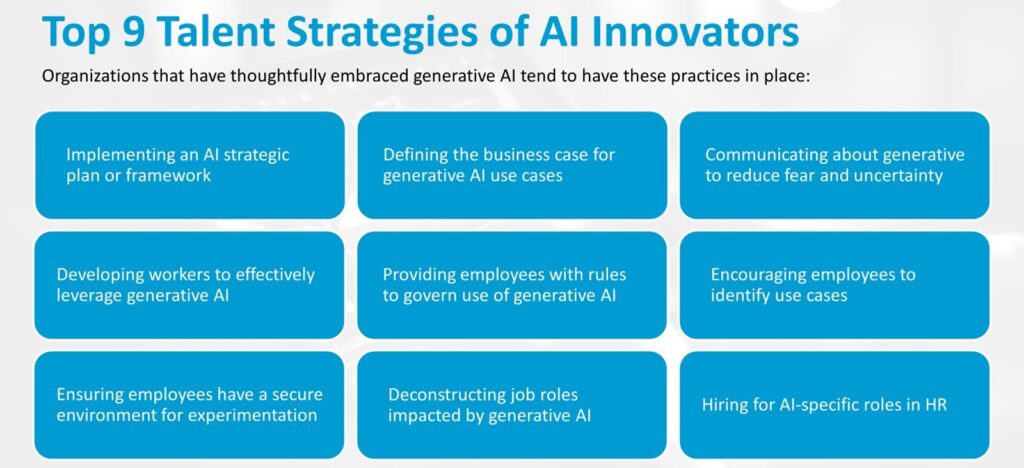[ad_1]
Final summer time, along with Human Useful resource Government, i4cp performed a world research of over 1,500 enterprise professionals on the state of AI inside the HR perform. We titled the research Is HR Already Behind within the AI Revolution?
I’ll give away the ending—the reply is sure.
Right here’s why we arrived at that conclusion: Nearly two-thirds (60%) of respondents stated that HR has little to no involvement in decision-making on AI governance, and over half (52%) stated they’ve little to no confidence in HR’s readiness to contribute to AI technique. A few third (34%) indicated that their HR groups don’t have any plans to make use of, or will not be prepared to make use of, AI.
Now, I do know what you’re considering. This was final summer time. AI is shifting so quick, certainly issues have modified, proper?
Properly, just some months in the past, we reran most of the similar survey questions with a similar-sized viewers. Belief in HR’s capabilities barely budged, with 51% of organizations having little to no confidence in HR’s readiness to contribute to AI technique. And the brand new survey confirmed that also near a 3rd of HR groups don’t have any plans or will not be prepared to make use of AI.
This wants to alter for a easy cause. A lot of the dialog round AI’s impression on the group entails adjustments to the workforce. Whether or not it’s higher efficiencies, effectiveness, productiveness, buying new expertise or upskilling present expertise, the main target is squarely on the world of the enterprise we typically count on HR to be the specialists on.
The excellent news is {that a} vital proportion of corporations are extra superior of their adoption of AI, and from a human capital perspective, we discovered they share widespread expertise methods. The next chart outlines the highest 9 expertise methods of those AI Innovators:

Outdoors of influencing AI technique and governance, there are additionally monetary and cultural advantages. AI Innovators are statistically extra more likely to report having:
- Excessive market efficiency
- Superior ranges of productiveness and innovation
- Improved value financial savings
- More healthy cultures
Conversely, organizations that aren’t AI-ready are statistically extra more likely to report having low market efficiency, decrease ranges of innovation and productiveness, and extra poisonous cultures.
As you would possibly count on, company boards are paying nearer consideration to the AI readiness and technique of the businesses they govern. In one other research i4cp performed, we discovered that solely 9% of board members we surveyed are very assured that their corporations are successfully upskilling and reskilling staff for an AI future.
And that is the place HR can take step one.
As we speak, it’s considerably shocking that solely a small proportion of organizations (22%) are formally creating their staff to leverage gen AI. Moreover, of the organizations which are doing this, most are solely upskilling a portion of their complete workforce. Actually, solely 10% of these surveyed from massive organizations (these with 1,000-plus staff) reported that gen AI coaching is being supplied to all staff.

Unsurprisingly, organizations that made up that 10% have been extra more likely to point out that the group has excessive confidence in HR to guide on AI technique.
Because the 9 expertise methods point out, there are various different methods for HR to exert its affect on their organizations’ future AI initiatives. Nonetheless, initially specializing in the upskilling and reskilling of the workforce is a good place to start out making an impression.
Collect ideas for upskilling your workforce for AI at HRE’s upcoming HR Know-how Europe, Could 2-3 in Amsterdam, plus hear Kevin Oakes current i4cp’s analysis and techniques for AI Innovators in his keynote on Could 3. Click on right here to register.
[ad_2]
